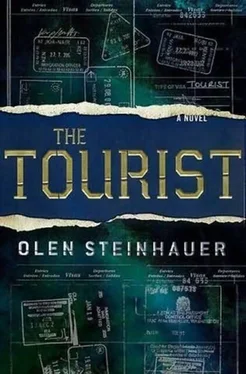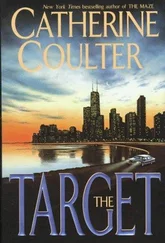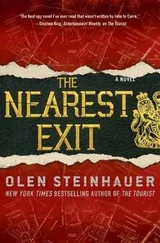The man held up his hands, palms out. "No, my mistake. Sorry to bother you."
The man walked off, and though Fitzhugh expected him to return to a table, he actually left through the front door. He'd been so convinced Fitzhugh was his friend Bernard that he had come in from the street. French? No-in his accent he'd caught Slavic traces. Czech?
Eleven blocks uptown, on the twenty-third floor of the Grand Hyatt, Simmons was sitting on her stripped bed, typing queries into the Homeland database, looking for the record of a Company agent, Jim Pearson. It came up empty. She tried variations on the name, then sent a message to Matthew, her plant inside Tourism, asking him to check the Langley computers, in case Jim Pearson's records hadn't made the trip to Homeland.
While waiting for the answer, she looked for whatever she could find on Yevgeny Primakov. In the morning, she would meet him in the lobby of the UN's General Assembly building, which, as George had put it, was "un-fucking-believable."
Unbelievable, indeed. From what she read on the United Nations site, Yevgeny Primakov worked in the financial section of the Military Staff Committee of the Security Council, with an office in Brussels. An accountant? She doubted that. Was his presence in New York a beautiful coincidence? Or had he made sure to be there in case he was called upon by the United States to answer questions about his son?
She accessed a secure section of the Homeland site, and her searches turned up a skeletal history of Yevgeny Aleksandrovich Primakov, onetime colonel. He was inducted into the KGB in 1959, and in the mid-sixties began his travels. Known destinations: Egypt, Jordan, West and East Germany, France, and England. When the KGB morphed into the FSB after the fall of the Soviet Union, Primakov stayed on, heading a department of military counterintelligence until 2000, when he retired and began a new career with the United Nations.
They had little more on him, though in 2002 the U.S. representative to the UN requested a background check on Primakov. No reason given, and the resulting report was not available.
During the last years, Homeland had been absorbing FBI files connected to terrorism, past and present. It was within this clerical subsection that she found a single sheet on Ellen Perkins, who was convicted in absentia for being an accomplice in two crimes: the 1968 robbery of a branch of the Harris Bank in Chicago, and, in early 1969, the attempted arson of the Milwaukee police's District Seven headquarters. Last spotted in Oakland, California, before disappearing completely.
Given what William Perkins had told her about Ellen-robbing banks in Germany-she was surprised to find nothing else under her name, or under Elsa Perkins. It took a Google search-Elsa Perkins Germany armed robbery-to come across a site dedicated to the history of seventies' German terrorist groups. Baader-Meinhof, the Red Army Faction, the Socialist Patients' Collective, and the Movement 2 June, which counted among its members one Elsa Perkins, American. According to the webmaster,
Perkins joined the Movement 2 June in October 1972. By most estimates, she was seduced into the Movement by the charismatic Fritz Teufel. She lasted longer than most members, but was arrested in 1979 and sent to Stammheim-Stuttgart Prison. In December of that same year, she committed suicide in her cell.
Milo's door opened. Three doormen stepped in, and he noticed that the swelling around Lawrence's eye was beginning to subside. It was Lawrence who held the manacles, which he attached to Milo's wrists and ankles; then the three of them went with their shuffling prisoner down the corridor to the elevators, where they used a special keycard to access the parking lot on the third underground floor.
They took Milo to a white van not unlike armored police vans seen in movies. In the rear, two steel benches stretched its length, punctured by holes through which Lawrence threaded the chains. Once they were out on the street, heading south, Milo could see through the tinted rear window that it was nighttime, and asked if it was Friday or Saturday. Lawrence, sitting across from him, checked his watch. "Still Friday, just about."
"And the eye? Looks better."
Lawrence touched it. "I'll survive."
In Lower Manhattan, the van arrived at Foley Square, took a side street around the Metropolitan Correctional Center, then descended into the secure underground lot. The driver showed his identification and prisoner-transfer order to the guards, who raised the gate and let them through. They parked beside a steel elevator and waited until the doors had opened before unlocking Milo and moving him to it.
"They have room service here?" Milo asked innocently.
The two other doormen stared uncomprehendingly at him, but Lawrence smiled. "Private cells, at least."
"Like I didn't have that before.”
“Come on, man."
Simmons's mail program bleeped for her attention, and she read Matthew's reply. The last record of a Company agent by the name of Jim Pearson was in 1998, when the forty-year-old agent with that name died of a congenital heart defect.
So Jim Pearson wasn't a Company agent-no real surprise there. All the ruse took was a fake badge. There was also no Jim Pearson in Homeland. What, really, did she have? Of course: the cigarette lighter that Stephanie had found in her room. Round Robin. A haunt of Washington politicians and their entourages.
She opened two browser windows, one to the House of Representatives, one to the U.S. Senate. In each she found the personnel directories and typed Jim Pearson. The House gave up nothing, but the Senate had a single Jim Pearson, who worked as an "assistant scheduler" to Minnesota Republican Nathan Irwin. There was no photograph, just his name. She followed links to Nathan Irwin's page and studied the list of twenty aides in his employ. There again was Jim Pearson, and a few lines above him was Maximilian Grzybowski, "legislative assistant." One of those unfamiliar Polish names that could easily slip a harried woman's mind.
At ten, when his phone rang, Fitzhugh was back at the Mansfield Hotel. He'd brought a bottle of scotch back to the room, but tried not to drink too much of it. "Carlos?" said the senator. His voice sounded tense.
Fitzhugh cleared his throat. "It's taken care of?"
A pause. "There never was a request."
"Wait a minute. Say that again."
"I'm saying, Carlos, that you made me look like a fool. I'm talking to the top man, and when he calls me back he tells me no one ever asked anything about you. Nothing. You may not understand this, but you only get a few favors from these kinds of people. I just wasted one of mine."
"If there was nothing," Fitzhugh began, but the senator had already hung up.
He felt like he was going to be sick. Not because of Nathan Irwin's anger-he'd worked in Washington long enough to know a senator's anger lasts only until the next good deed you do for him. What upset him was that Sal's message, sent through the proper channels, had been wrong. For the past six years, Sal had been Tourism's best source inside Homeland Security. His information was never contradicted. This time he'd made a mistake.
Or perhaps, Fitzhugh worried as he plunged deeper into the scotch, Homeland had uncovered Sal, and was now using him to feed disinformation into Tourism. Was that possible?
He set his scotch aside and dragged out his laptop. It took a moment to power it up and access the Nexcel account, but as soon as he did he drafted a quick e-mail to Sal:
Information proved wrong. Is it a mistake, or were plans changed? Are you compromised?
He sent it off with a hard click on the trackpad button, only afterward realizing his mistake. If Sal were compromised, then Homeland would be watching his account. What would they do? Write back in his name? Probably. What reply, then, would prove he was compromised? That is, what would Homeland want him to believe?
Читать дальше
Конец ознакомительного отрывка
Купить книгу












